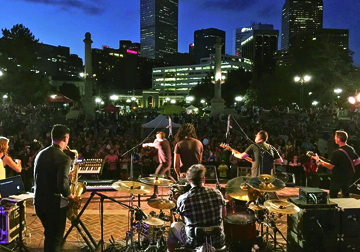Ruby Hill Park Turned Into Music Venue
by Glen Richardson
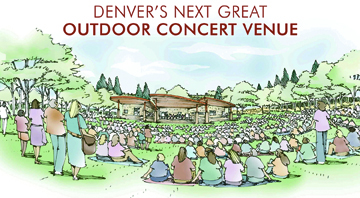
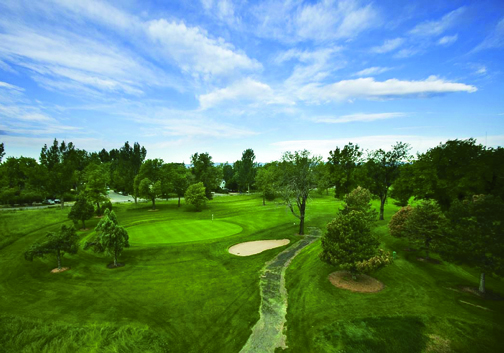 Mayor Michael Hancock’s administration’s unceasing efforts to reduce parkland available to Denver residents and to monetize what remains was greatly enhanced by a scheme to turn Ruby Hill into an outdoor music venue throughout the year and convert adjoining Overland Park Golf course into a mega concert location for six weeks each summer.
Mayor Michael Hancock’s administration’s unceasing efforts to reduce parkland available to Denver residents and to monetize what remains was greatly enhanced by a scheme to turn Ruby Hill into an outdoor music venue throughout the year and convert adjoining Overland Park Golf course into a mega concert location for six weeks each summer.
The permanent Levitt Pavilion at Ruby Hill has been constructed at 1380 W. Florida Ave. near I-25 and Santa Fe along the Platte River. The first event is scheduled for July 20, 2017.
There are supposed to be 40 to 50 “free concerts” and 15 to 20 ticketed events. One resident noted: “There is no such thing as a ‘free lunch’ or a ‘free concert.’ Somebody is paying and somebody is making money. We know the city government is totally corrupt. The whole thing has the stench of a con job which we will learn about only later, if at all. I believe nothing the mayor or the members of the City Council say. Pockets are being lined throughout the city.”
The venue is projected to be about two and a half times bigger than Red Rocks Amphitheater, according to the Levitt website. The first free concert is Slim Cressna’s Auto Club. The first paid event ($40, $55 and $75) is the following night (July 21) when
UB40 legends Ali, Asto and Mickey, with special guests Matisyahu and Raging Fyah entertain. The next free concert is the Stone Foxes playing on July 23. Free August concerts are The Suffers on Aug. 3, John Fullbright on Aug. 4 followed by Gaby Moreno on Aug. 24. Levitt Pavilion’s first Beer Festival on Aug. 26 is expected to keep the “Rockin’ Ruby Hill Summer” hot as they’re adding a free concert by Karl Denson’s Tiny Universe considered as one of the best live bands on the planet. Denson now serves as the saxophonist in the Rolling Stones.
The just completed Pavilion itself is a metal mesh-clad building under-laid with a LED screen surrounding the stage. The stage is 43-ft. wide in the front, 30-ft. deep and 60-ft. wide in the back. The stage is large enough to hold the entire Colorado Symphony. The venue includes built-in food truck pads plus concessions. The venue’s official capacity is 7,500 concertgoers, with about 2,500 fitting within the main area where alcohol is allowed. But as executive director Chris Zacher reminds attendees, “The good thing about the venue is we have a movable fence line!”
If huge crowds and the musical rebellion starting up at Levitt Pavilion isn’t enough to keep Denver’s south neighborhoods awake at night the City of Denver’s approval on June 20 for a three-day festival across the Platte River at the foot of Ruby Hill on the Overland Park Golf Course beginning in Sept. 2018 has even more detractors. That festival will be an annual event featuring musicians from a variety of genres on multiple stages, as well as food, art and culture. The private promoter of the admission-based music festival says it could host “between 60,000 and 200,000 people over three days.” The historic golf course is a quiet, countrified space just north of Evans Ave., east of South Santa Fe Blvd.’s rushing traffic and west of the Platte River. Many neighborhood residents had hoped to see it remain that way. Proponents, however, say “it will put Denver on the map and bring money into the neighborhood.”
Giant entertainment firm AEG pulled out and Superfly, the company behind both the Bonnaroo in Manchester, Tenn., and Outside Lands Festival in San Francisco is the winner. They receive a five-year, six-week contract annually with the city and the golf course. The amount of time allows for setup, teardown and damage repair. The City Council approved contract is for five years at an annual rate of $200,000, with “additional monetary and non-monetary considerations,” to produce the annual three-day music festival at Overland Golf Course located in Council District 7.
The June 20 Overland Golf Course deal (City Council Bill 17-0678) was offered by District 8 Council member Chris Herndon and received unanimous approval. Wayne New was absent. Citizens briefed on the proposal say the festival will be modeled on the Outside Lands Festival in San Francisco. That event drew 210,000 people last August.
Helene Orr, who lives on West Jewell Ave. across from the Overland Park course, says, “It wasn’t a real process to me. We aren’t in the contract. We can say ‘XYZ’ but how will we know?” Her worry: She believes the city intends to turn Overland Park into a permanent, large-event venue and notes that the Levitt Pavilion opening this month will already host 65-70 concerts per year. While Denver has more concert venues than say Austin or Nashville, it doesn’t have a Sixth Street or Music Row comparable to those cities. Valley music fans truthfully want Ruby Hill to become that location and so does the Mayor’s office and Parks & Recreation Department.
Listen To Tone
Area residents around Levitt Pavilion say they will be closely monitoring noise complaints and sound levels during both free and paid concerts beginning this month. Levitt officials say they hope to work with neighborhoods and make sound adjustments. The reassurances, however, aren’t likely to mollify neighbors opposed to the venue, especially once the fall school season begins.
In addition to the Valley’s music interests, there are supporters for next year’s mega concert on the Overland Golf Course. Rob Lovell and Rana Razzaque who live directly opposite the driving range — where the main stage would be built — argue, “This is progress.” It will be noisy for three days, but it will bring in world-class musicians. “A few large trucks are a small price to pay for a top-notch festival,” says Lovell. Razzaque believes the event will increase infrastructure into the area. A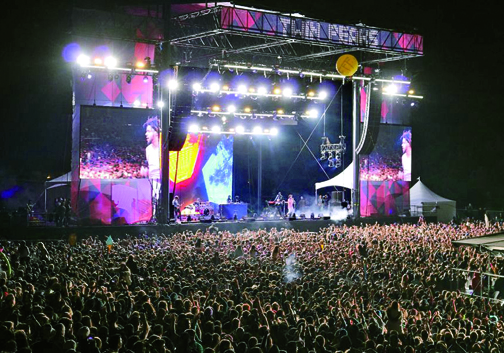 dds resident Paul Bodor, “I didn’t hear any downside that concerns me enough to cloud my enthusiasm.”
dds resident Paul Bodor, “I didn’t hear any downside that concerns me enough to cloud my enthusiasm.”
Before the Overland proposal was approved, the tone of the debate was less harmonious. “Parks are under attack all over the city and we have to band together to maintain our quality of life in Denver,” says parks activist Bridget Walsh. She has been critical of the Hancock administration’s use of City parks in the past. Mara Owen, president of the Overland Park Neighborhood Assn., says residents have been assured the golf course event would only go forward if community groups agreed it was a good idea. But Walsh adds: “Owen and I fear 200,000 people on a golf course will come to a no-good end.”
City Has The Brass
Denver put plenty of backspin o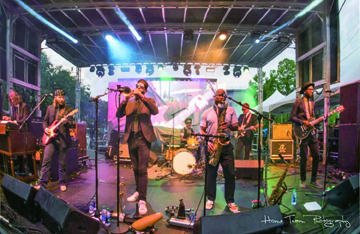 n the proposal because with approval the city has scored an ace: The city will get between $1.5-$2 million from lease fees and seat taxes per year, more as attendance increases. District 7 City Councilman Jolon Clark calls the festival “an opportunity with an estimated $60 million economic impact.” Clark acknowledges that the money will go to the City’s general fund and not to the neighborhood. He adds, however, “I’ll fight to the death to secure the neighborhood a fair share.”
n the proposal because with approval the city has scored an ace: The city will get between $1.5-$2 million from lease fees and seat taxes per year, more as attendance increases. District 7 City Councilman Jolon Clark calls the festival “an opportunity with an estimated $60 million economic impact.” Clark acknowledges that the money will go to the City’s general fund and not to the neighborhood. He adds, however, “I’ll fight to the death to secure the neighborhood a fair share.”
Adding to the City’s winning scoring game is Denver Parks & Recreation Executive Director Happy Haynes. She promised in a press release to “fulfill the guidelines set forth during the community input process.” Furthermore, she adds, the City will “hold the event organizers accountable to protecting that, which is valuable to our city, its residents and neighborhoods.”
Continuing public concerns and questions about the Overland Golf Course deal can be categorized into four main themes: 1) Concerns about impact to the golf course; 2) Concerns about impact to the neighborhood; 3) Benefits that would come to the golf course and surrounding area; and 4) Concerns regarding the contract length, local artists, affordability and revenue to the City. Despite the approval many residents say they have mistrust toward the city and wanted specific guarantees and accountability. Furthermore, residents remain uneasy about parking, trash, noise and community safety.

